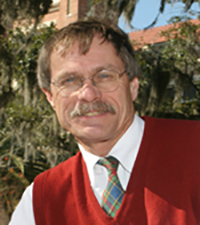
Florida State University has embarked on what may be one of the most ambitious ongoing plans for academic cluster hiring in the nation.
Over the next five years, FSU will authorize the hiring of about 200 new tenured or tenure-track faculty members by recruiting in clusters of five to eight people focused on an academic theme, according to W. Ross Ellington, associate vice president for Research. The themes are being proposed, developed and implemented by current faculty to build on the university’s unique academic strengths in areas of intellectual, economic and social importance.
"Cluster hiring affords a means of advancing the university in strategically targeted areas," Ellington said. "This approach maximizes the opportunity to propel programs into national and international prominence. Although we have many programs that are of world-class caliber, many others are on the cusp of reaching such distinction. Cluster hires in these programs will provide the vehicle for them to go to the next level."
Many of the new hires will be senior faculty who will arrive with fully established programs, grants and graduate students and postdoctoral fellows, Ellington said. Cluster hiring is part of the university’s Pathways of Excellence initiative, a series of goals that includes enhancing the university’s federal grants and awards, scholarly productivity, graduate program and faculty recognition and the breadth and number of students who earn doctoral degrees. There will be five rounds of campuswide competitions to determine which cluster proposals will receive funding.
Already, hiring is under way for two areas that are serving as pilot programs in the cluster hiring initiative. For the "Integration of Genotype and Phenotype" cluster, eight faculty members spanning the areas of molecular genetics to evolution will be hired to study how the genetic program plays out to form the features of the whole organism. Led by the biological science department, this is a totally new effort at FSU and will have few, if any, counterparts nationwide, Ellington said.
English is the lead department for "History of Text Technologies," in which an interdisciplinary cluster of new hires will study the centuries just before and after the technological evolution from manuscript to print in Western Europe, especially in the related literatures and cultures of England, France and Italy.
Recruiting has begun for four other clusters that were approved by FSU Provost and Executive Vice President Lawrence G. Abele in the first round of funding. A committee recommended them after evaluating 44 proposals submitted by faculty.
The four new clusters are:
- Growth, Processing and Characterization of Advanced Materials (industrial engineering and mechanical engineering). The research effort leverages expertise at the National High Magnetic Field Laboratory and involves the participation of engineers, chemists, physicists and computational scientists. The research focus will be the design, synthesis, processing, characterization and application development of new materials.
- Extreme Events: Modeling and Extended Forecasts (meteorology and oceanography). The research focus will be the simulation and prediction of extreme events such as hurricanes and severe storms.
- Experimental Social Science (economics and political science). Several FSU faculty members who are pioneers and practitioners of this methodology will build a center that rivals the few such efforts existing elsewhere, Ellington said.
- The Psychology and Neurobiology of Dysregulated Behavior (psychology). Capitalizing on existing strengths in neuroscience and clinical psychology, this cluster will be a world-class group studying behaviors such as suicide, violence and substance abuse.
"There will be a synergistic impact by bringing in faculty focused on a common academic theme," Ellington said. "That is, we expect that the output of the whole in terms of research, grants and doctoral student training will be greater than the sum of the individual contributions of the hires.
"We also believe that creation of these clusters will facilitate the development of many new interdisciplinary doctoral programs that will tap into new and stronger pools of graduate applicants."
The second round of the campus-wide cluster hiring competition will begin in early December with the expectation that six or more new clusters will be approved in June.




